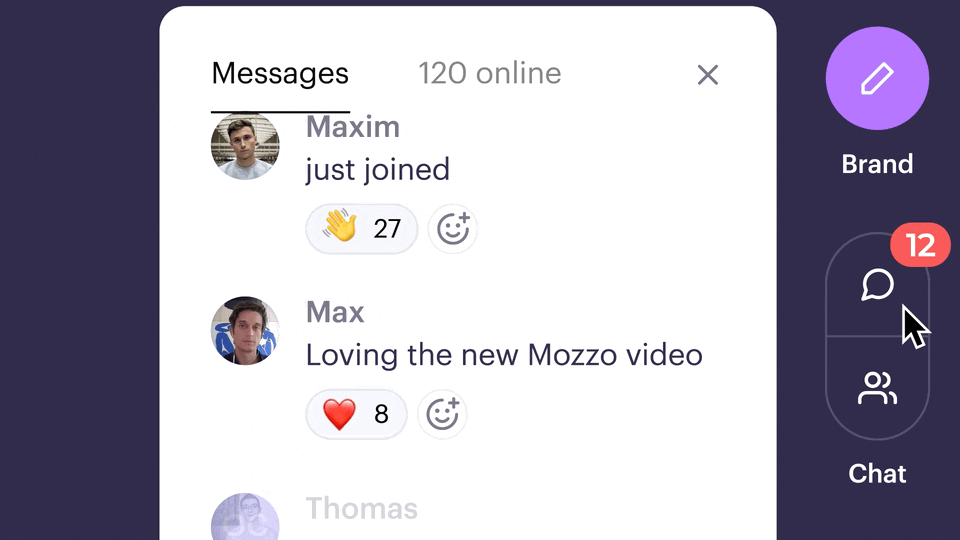You've likely seen one yourself: the webinar Q&A. Some people call it the Questions and Answers. They're typically the last 15 minutes of a webinar where people in the audience can ask questions to the panel of speakers.
It is often one of the most important sections of hosting a webinar, because it's one of the few ways the audience can directly interact with the speakers. In this article, we'll show you how to best organize a Q&A session during your webinar. And get more value from the ones you're hosting today.

What is a Q&A session?
Questions and answers, or more commonly known as Q&A sessions are typically blocked slots for the audience to ask their questions to the speakers and or panelists of the webinar.
Why you should always host a Q&A session
People organize Q&A sessions to build relationships and provide specific answers to their audience. This is because it's a lot easier to share specific information during a webinar than create lots of different pages on your wbesite. That's why Q&As are a great format to have during your webinars.
Q&A sessions are especially great for when you have a speaker who has a lot of domain authority. Not only, will it attract more people to your webinar – it will likely also increase the engagement during the webinar itself with lots of questions asked to the speaker.
The benefits of a Q&A for the attendee
Your attendees likely have specific questions that they want answers to. Your website doesn't provide the answer and speaking to a sales rep is probably a little too early in their buying journey. This is one of the main reasons why people attend webinars and Q&A sessions. To get answers to their problems without having to spend too much time researching or in a call with a sales person.
Luckily, there are also a lot of other reasons for you as a webinar host on why you would want to host Q&A sessions. Let's look at them now.
Use Q&A to build better relationships
It is when you provide your attendee with value that you start building a relationship with them. The stronger this relationship, the more likely it is that this person will do business with you in the future.
We see this with our own webinars, over 70% of our current customers has watched at least one of our webinars before purchasing Contrast.
Use Q&A to do personalized follow-ups with prospects
There is no better way of understanding the problems your prospects have than by listening to their questions. It will give unique insights that you'd normally not be able to get. You should use this information to later follow up with them and provide them with more information than you could during the webinar itself. Think of an ebook, video or a call with a product expert.
So make sure that you can at least export the Q&A or transcript from your webinar platform. If you have larger audiences and this is too much work to do manually, you should look into setting up a CRM integration.
Use Q&As to create better content
You know those FAQs at the end of a website or blog article? Well most of ours are generated by our prospects and customers. There's no better way of seeing your prospects their problem through their eyes by simply reusing the questions they ask you.
It's during the Q&A that you'll understand what questions are on their mind. You can then simply reuse these questions on let's say your website and provide answers to them.
Now that it's on your website, people that Google the same question will likely find your website. Et voila!

Understand how engaging your webinars are
Finally, we believe that questions asked is not a sign of how clear your webinar was, but more about how engaging it was. You should want questions. Especially the hard ones, because when you answer them successfully you'll build brand authority and people will see you as the expert in the market.
At Contrast, we like to use a Question x Attendee ratio. In other words, how many questions do we get per attendee. This is of course not higher than 1. But it's a good metric to track and improve over time.
7 Tips to improve your Q&A sessions
- Before the webinar starts, let people know when the Q&A will take place and ask them to already drop their questions. This leaves more time for you to organize the Q&A.
- Throughout the webinar, you can of course keep on reminding people to already drop their questions.
- Ask other people to upvote the questions they like most. This will function as a natural filter and saves you a lot of time. Note that not all webinar platforms support upvoting.
- Get the Q&A going by planting a question in there yourself. Is is often that the first question leads to more questions. We even go as far to plant a question that actually makes a little bit uncomfortable. We explain why here.
- Don't put a slide for 15 minutes with just the word Q&A on it. It's your prime real estate. Instead use a CTA. We explain why in more detail here.
- Speaking of which, don't be afraid to let loose of the "15 minutes of Q&A at the end" type of webinar. Build moments for questions to keep people engaged throughout. Or simply take questions as they come. Experiment!
- Use a webinar platform that allows you to add the question to the webinar itself, instead of a menu. It leads to have participation during the Q&A session and makes great content for social media.
Organize more engaging Q&A Sessions
If you're looking to host more engaging Q&A sessions, it's worth looking into a next generation webinar platform like Contrast.
On Contrast, you can add a question from the chat to the webinar video itself. This is what it looks like. As you can see, they're branded too.

The benefit of this is that people can simply continue chatting, instead of looking for a Q&A menu. This leads to 46% higher engagement during webinars – and 32% more questions asked. That will help you build better relationships and close more deals down the line.
You can host Q&As like this for free on Contrast. Sign up now, no credit card needed.


The New Way to Run Webinars
Start for free up to 30 registrants. No credit card needed.
Start for free